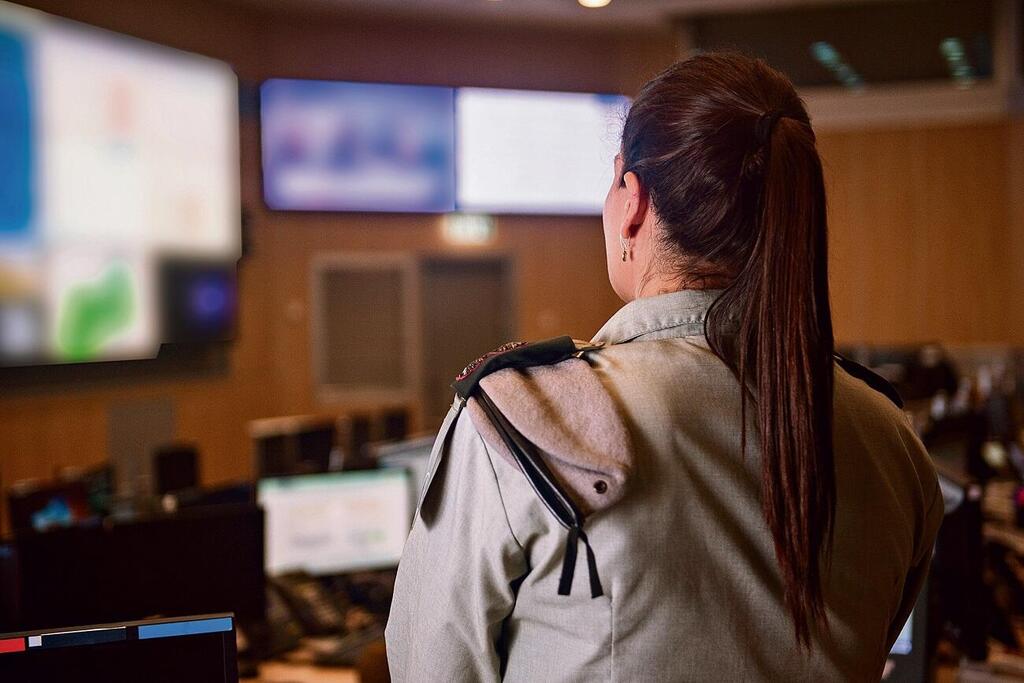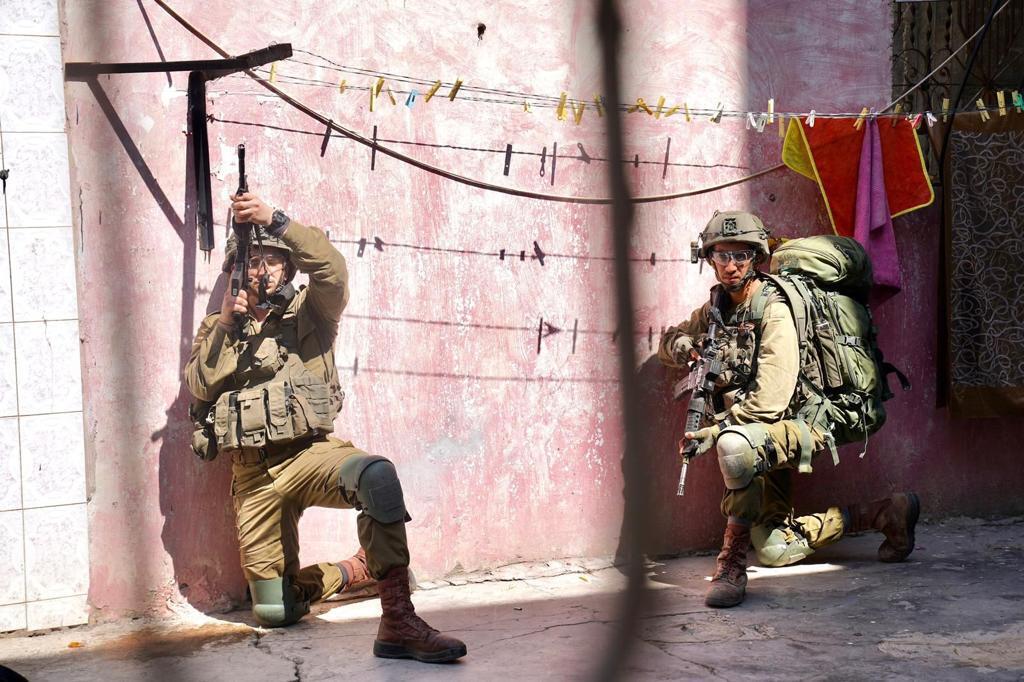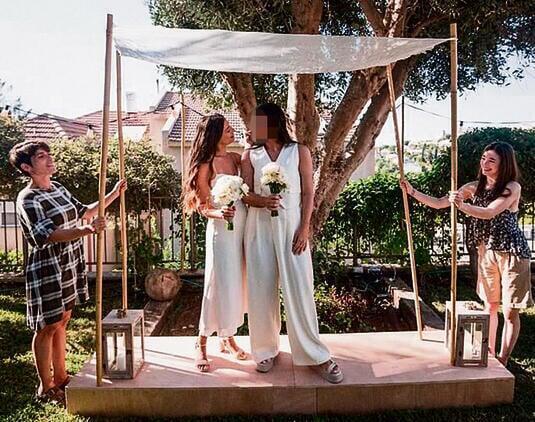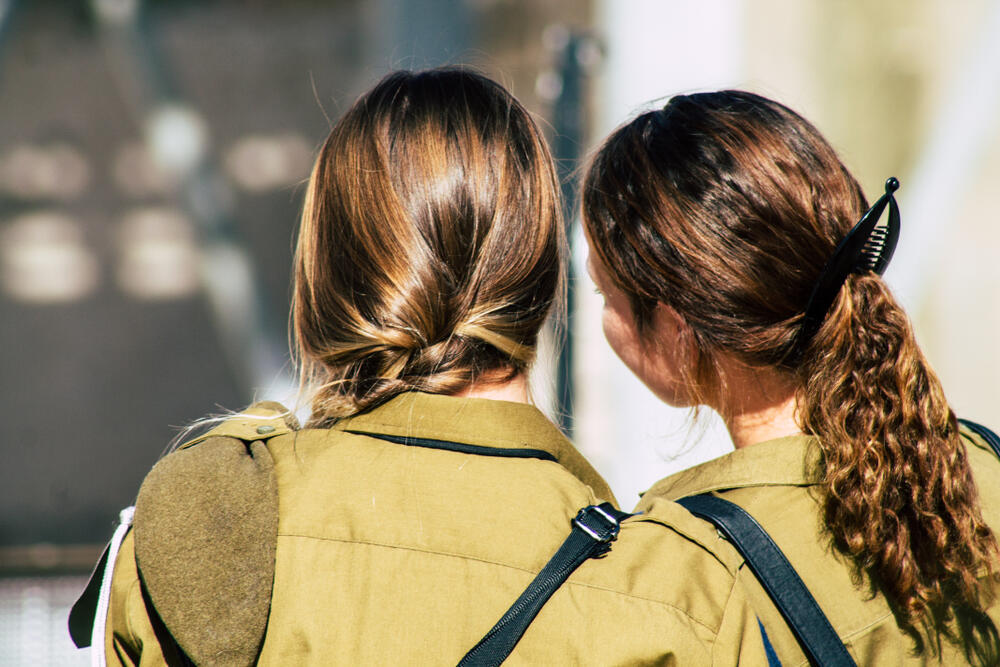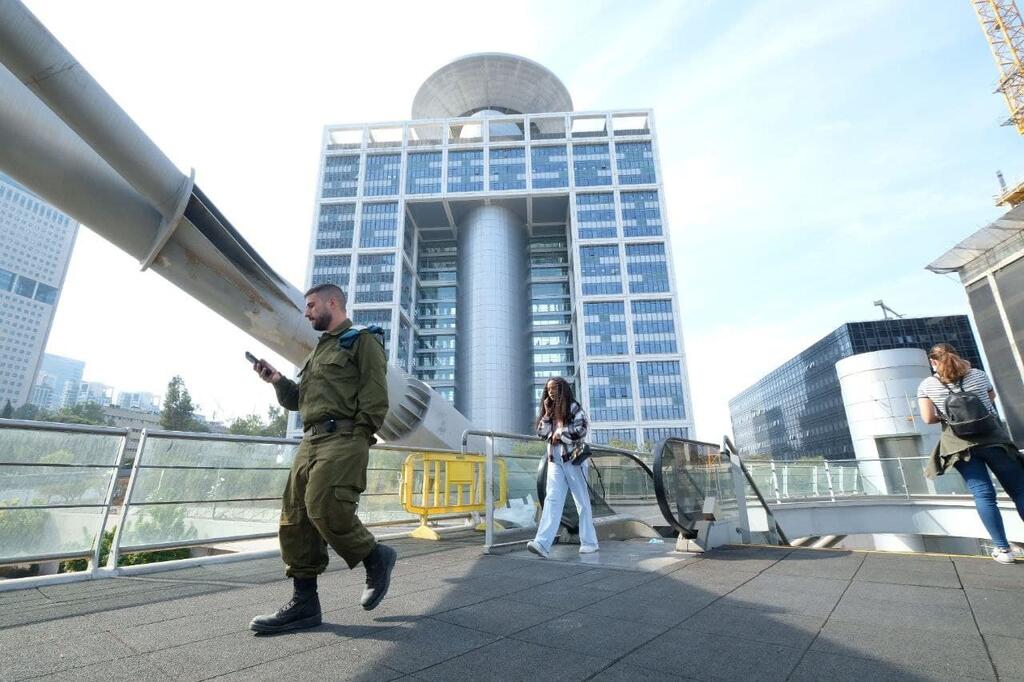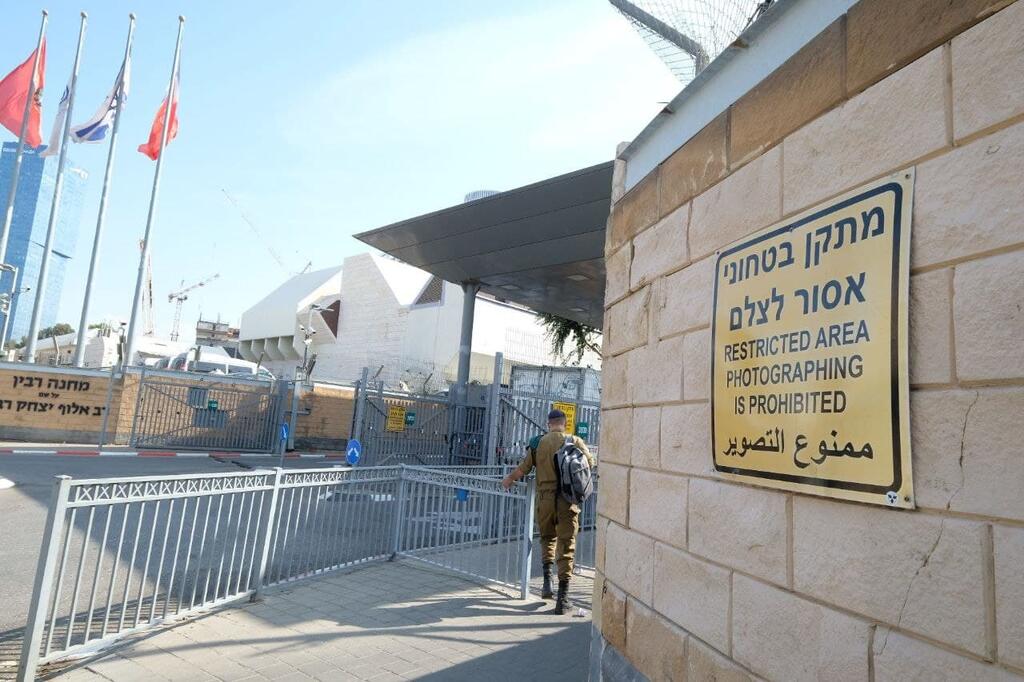Only one woman was present at "Mitzpe," the IDF's top command center, during the recent counterterrorism operation in Jenin. She sat not far from the chief of staff in the round, equipment-filled room underground.
More stories:
At five in the morning, she received the initial situation assessment. She didn't wear her rank insignia to avoid attention ("I stopped wearing it at week 17 of my pregnancy because it got tight"), and even during the operation earlier this month, in her 29th week of pregnancy, she chose to sleep in her small office, just two steps from the most secretive command center in the IDF.
Now, here's a secret that we can reveal. In her small office, there's a bright Formica-covered cabinet. With an easy pull, it opens into a bed along the wall ("Surprisingly comfortable, I sleep well in it"), and one of the desk drawers stores personal items for showering and changing. For her, the unexpected is routine. "Most of the time, I don't see daylight."
"These were four very intense days of combat," says Lt. Col. S., the first woman to serve in her role in the army’s Operations Directorate. Days before the operation, she was summoned to the command center ("Mitzpe knows everything before it happens"), and only due to the heavy heat, she didn't arrive at the base on her bicycle, as usual. "Eden, my wife, couldn't give me a lift because she had to stay at her base for Shabbat," she adds incidentally.
So, how did you get there?
Lt. Col. S. sits across from me with a slight look of surprise and weariness. She has no interest in trivial matters like her commute. "From Saturday noon until Tuesday night, we were on full alert," she describes in a brief interruption.
"Lots of schedules and situation assessments. We kept reporting to the chief of staff, and the operation ended with great success. Once we were attacked from the air, and besides the element of surprise, we minimized friction with the civilian population. In this operation, there were almost no uninvolved casualties; nearly everyone was an armed combatant, and that's a significant fact.
Unfortunately, we had one casualty, a soldier from the Egoz unit. Despite the sorrow, it was a short, targeted, and high-quality operation. We controlled all the parameters, managed it well, and didn't stay in Jenin for even a minute longer than necessary."
According to her, the operation in Jenin was different from operations in Gaza. "In Jenin, I feared for our forces even more than usual because they were constantly in close quarters, almost face to face, and that's not something we do very often. Not in such large numbers of fighters and not with such proximity. It was the hardest and most stressful part."
There was also one instance during the last operation when the chief of staff rolled the onus on her. "After 20 hours of combat, a dilemma arose: to stop or to continue," she reveals. "I presented to the chief of staff the pros and cons, and he, along with the political echelon, decided to continue for another day. We created the deterrence we wanted to achieve there, and we allowed the Palestinian Authority security services to enter Jenin and operate there. It was their responsibility."
During your almost year-long tenure, have you made decisions that turned out to be a mistake?
"My commanders grant me autonomy and trust my judgment. Not all my decisions were right, but I stand by them every day. 'A wrong decision' is too strong; there were times when I made a decision that wasn't entirely accurate, and my commander instructed me to be more precise. From such cases, I learn how to do better next time."
IDF chief Lt. Gen. Herzi Halevi is her commander’s commander. For a moment, the pyramid doesn't seem too high. "The chief of staff was among the first to congratulate me when I arrived in civilian attire," she chuckles. "He instantly understood."
Then she puts on the host's cap. "Everything is managed from here," she leads me to the spacious hall adorned with headlines, ascending and descending maps and endlessly changing and updating screens. Graph lines jump on the right side, scattered on the left. If you suffer from some sort of learning disability, like me, you'd lose your hands and feet, but her eyes take it all in and process it with a quick glance.
"This role is not about being a woman," she emphasizes. "It's about someone with experience who can read and understand the situation quickly. A document arrives? I read it and immediately grasp what I need to deduce from it. It's an immense responsibility."
At the back of the hall, behind the bulletproof glass, sit the female intelligence officers and commanders who manage the command center. "Many people, mostly women. Doesn’t it seem like they're sitting in a control room of a movie director? They observe and hear everything that happens in the control room, but the glass is soundproof so that we don't hear them. We think quietly and speak quietly, far from regular silence. The moment a message about an event, like a complicated arrest, is received, within a second, the Mitzpe goes from zero to sixty, and we dive into the concentration and sharpness. I communicate through my headset with the women behind the glass. They will provide us, the commanders, with the necessary data in real-time for the chief of staff to make decisions. 'Data-Driven Decisions' is not just a slogan."
Are you the one who calls the chief of staff?
"No, the combat manager sitting at the Mitzpe is responsible for updating the senior officers, and there is an order. First to the chief of staff, then to the defense minister and the prime minister. During this time, I'm busy with 40 other things, such as preparing the situation assessment, giving recommendations, managing representatives from all the commands at the Mitzpe, and also thinking about the next steps. For example, will Gaza wake up? There is no day that begins like its end. I feel the weight on my shoulders."
7 View gallery
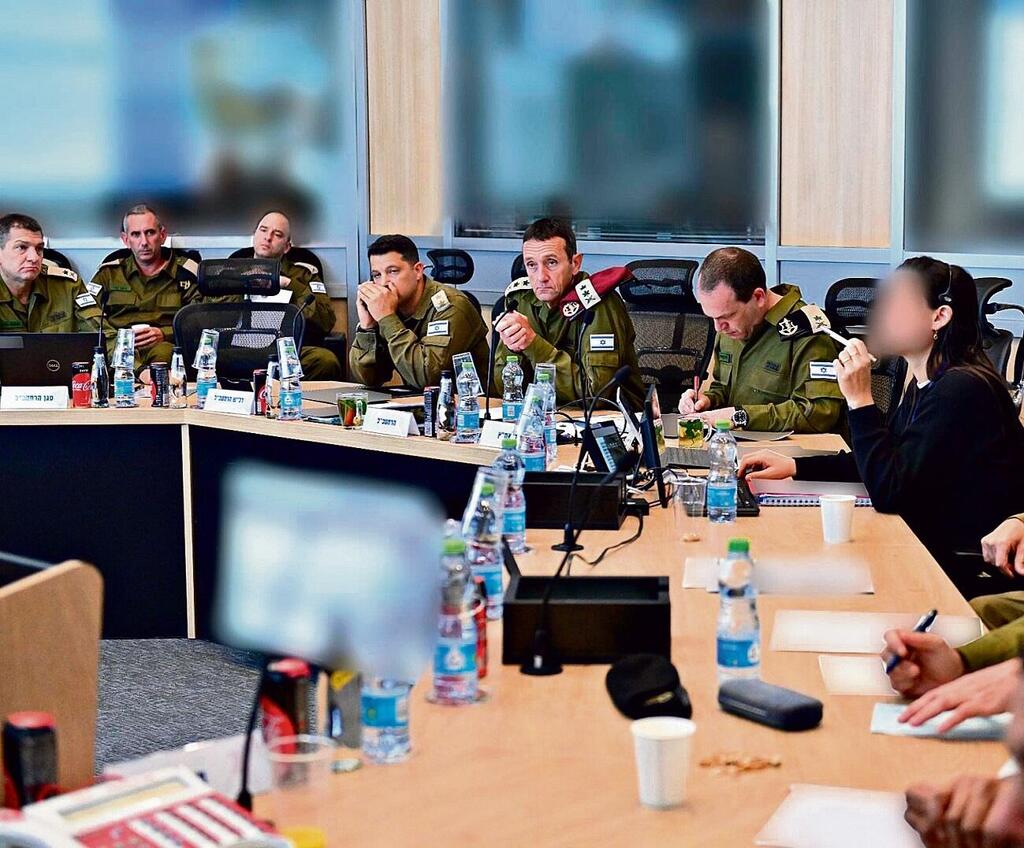

Lt. Col. S. (right) and IDF chief Lt. Gen. Herzi Halevi (center)
(Photo: IDF Spokesperson's Unit)
Only a few people know you.
"What's the question?" she says, being two steps ahead of me, "It's clear that I do what I do for the benefit of the lives of millions of Israelis. I receive appreciation from the commanders and the warm, loving family. And the truth? That's enough for me."
Do you believe that someday there will be peace in our land?
"I really want there to be peace, that innocent people won't be killed, that there won't be attacks in Tel Aviv, that the residents of Sderot can sleep peacefully at night, and that the Palestinian population can lead good lives. But I don't believe it will happen as long as people in key positions, worldwide, are driven by ego and power, not compassion."
Do you have a chance to reach the top of the pyramid, become chief of staff?
"No. Today, the chief of staff must have combat experience. I don't have that. I started my career as an infantry instructor."
The unity of the fronts
The recent operation was the climax of months, S. described as "very, very eventful. The event at the Egyptian border, where three soldiers were killed by an Egyptian officer, was something we hadn't seen in over a decade. Here, at the Mitzpe, the operational headquarters of the chief of staff, we dealt with rocket fire from Lebanon, the Gaza operation, and the month of Ramadan. These adrenaline-filled events undoubtedly intensify the sense of responsibility and significance, but there's no doubt that I would prefer a quiet night at home with my wife, Eden. We got married less than a year ago, in September. Both of us wore white."
Eden is a Second Lieutenant, 28 years old. Her full name and rank are disclosed. "She's energetic, beautiful and amazing," S. enthuses, "and it was Eden who gave me my ranks on me. Not mom, not dad, without disrespecting them. I wouldn't have gotten where I am without Eden's encouragement and support. She managed to hold on to me even when things got tough," she demonstrates a choking movement. "I told myself, 'Eden is an officer in the IDF; she doesn't need rehearsals,' but no. Surprise. Despite knowing the ranks, she fumbled with the pin, and it took her quite some time."
The soft tranquility emanates from Lt. Col. S. as she talks about her significant other, who was not present when the phone rang, and she answers, listens, asks, and jots down a few things on a squared yellow notepad. "I've been serving in the Operations Directorate, which is the beating heart of the IDF, for three years now," she says, "and the experiences I've accumulated during these years, especially since I became the operations control officer, have deeply ingrained and shaped me.
Thanks to them, I feel more prepared for any scenario. They sharpened me, and I always have a sense of what will happen next. The ability to envision events makes me a better commander. Almost a year ago, when I entered this role, which includes commanding older men, they didn't know how to process me. They belittled me, asking, 'You've never been in a place where an explosive device went off; what will you do when there's a report of a device?' At first, I didn't know whether to laugh or cry. I asked them, 'What's the context? I know what to do when there's an explosion, which forces to mobilize, what the reporting chain is, what decisions to present to the chief of staff, whether to retaliate.' That's what I’m good at. And if there's a man who understands this better than me - please."
As the operations control officer of the chief of staff, you're the one who issues the orders?
"Definitely. The Air Force won't scramble a fighter jet unless an order comes from here. Everything that happens in the IDF flows to us in every possible way. In the past two years, since I became the operations control officer, an event doesn't end with its specific sector; there's a connection between the sectors, and I try to identify what will happen before it erupts. In the last exercise, which lasted two weeks, the chief of staff came here twice a day. He must come to the Mitzpe to mobilize the entire IDF system. Not that I boast about myself, but only here can you have control over everything that happens in the army. Unlike specific commands, I see the whole, the complete picture."
She is 34 years old. Her parents met during their military service. She grew up in a moshav in central Israel, studied in an agricultural high school ("back when it was truly agricultural"), and was a very active Scout. "People always told me that I'm good with people, that maybe I'd make a good lawyer. I liked the frameworks of the Scouts and high school, and I wanted to be part of some social group where I could have an impact. I enlisted with the understanding that I wanted to be a combat instructor. I didn't want to be a combat soldier. Maybe I wasn't fully aware of the strength and significance of female combat soldiers."
And you regret it.
"I wouldn’t go that far. If I had received better explanations, I might have changed my mind, but I don't like to live in the past. I'm very content with the direction life took me, but in hindsight, I think I could have been a good combat soldier."
‘Complete non-issue’
After three roles as an officer in the IDF, she went on to study on behalf of the military at Bar-Ilan University, majoring in national security and military studies. Meanwhile, she was involved with IGY, the LGBTQ youth organization.
"I told the 14-year-old students that the first step out of the closet is not in front of the family but rather in front of yourself. During one of the sessions, I invited the students' mothers and told them: 'Give your parents time to process this. You have already gone through a long process with yourselves, but your parents are just beginning. It doesn't mean that being LGBTQ is negative; it just means that it's different from everything the mothers dreamed and planned for you’."
How was your coming-out process?
"Being LGBTQ in a small community is not like being LGBTQ in Tel Aviv. I was in the closet until a terribly late age. Today, when I process my memories, I think I always knew that I loved women much more than men. In movies, for example, in a kissing scene, I would be moved by the girl’s lips and not interested in the boy’s actions. But it's important to note that it was a different era back then. There was no discourse about this subject yet. There was no TV series that portray women openly. What was on TV? Children's channels. Yes, Dana International was already on the map, but she was the only one. I was sure that I was the only one in the world who loved girls."
In 12th grade, she fell in love with a girl from her class. "First love, dramatic and intense, but a great start. Today she's married to a woman, and we're still in touch."
It was only at the age of 23 that she sat her parents down to talk. "I still hadn't been able to say the word 'lesbian.' I told my parents that I was going out with someone, that I loved her very much, and that I wanted them to meet her and be able to bring her home. They both responded amazingly. Also, when I was an officer in the combat instructor course and told my team that I was in a relationship with a woman, the reaction was 'Okay, no problem.' Absolute non-issue. When I arrived at a role that was very significant for me, I came out of the closet in the opening speech in front of 240 cadets."
Why did you decide to do it?
"For two reasons. Firstly, every time I arrived at a new place, it was in the air. The second reason is related to my new role. I wanted to be like the commander who introduces themselves in the opening speech and says, among other things, 'I am married to this person and that person,' and no one jumps up and says, 'Wow, he's straight.' I felt that if I present myself as I am, I'll be a better commander. This is who I am, and it's essential for me to create a pleasant and safe environment for the soldiers. LGBTQ discourse today involves youth, soldiers and officers, and if any of them feel the need to share, my door is open. I believe it's part of our role as commanders."
She met Eden, her partner, six years ago. “After I came out, she approached me and revealed that she, too, is a lesbian, and no one knows about it. We were both in other relationships at the time. Our relationship began only a year later and since then, she has been the one for me. We were engaged for many years, but the pandemic forced us to postpone the wedding again and again. Two years ago, we signed a cohabitation agreement and I no longer cared about getting married; however, Eden's mom, who is a bit like my mom, asked me what picture our future children will see for their family tree project in school. We had a small wedding at her parents' house, and it was incredibly moving. Of course, I shared the wedding picture with all my soldiers and displayed it on the wall."
Do you think Avi Maoz would have approved of it?
Lt. Col. S. chuckles. "I prefer not to get into politics because today, even regarding LGBTQ issues, the army is much more progressive than people think. Here, in the observation post, I have religious officers from West Bank settlements, religious combat soldiers, and I have never felt that they cared about the fact that I'm married to a woman, certainly not because I'm a woman.
Nevertheless, you were the first woman to be appointed as commander of the largest operations room in the IDF.
"There's no doubt that it was a courageous decision by my commander. The army chooses to change and progress. So when it chose to appoint a woman to the post, who doesn't have children yet, they understood what it meant."
No need for a blond sperm donor
Her face makeup free ("Only at our wedding, I put on makeup, just a little, and felt a bit like Purim"), her long-sleeved shirt hides an impressive collection of tattoos ("I have more than 30; I call this hobby body art"). She wears three rings: an engagement ring, a wedding ring and a love ring, a common practice among the LGBTQ community, composed of the first letters of her and her partner's names, E and S.
As Lt. Col. S. is six years older than her wife, they decided she would be the first one to give birth. "We started looking for a sperm donor, and it was an interesting process because it's not the type of thing I can discuss with my mom or Eden's mom and seek their advice. Both are amazing, but they didn't experience pregnancy through sperm donation. It took me time to understand what was needed, how, with whom, what genetic tests and more. Two officers are in charge of the files, and everything is organized and precise. It was important for us to share everything. It's clear she'll be her second mom. Eden is 50% of what's happening here," she touches her belly.
The thought of involving a man in the picture never crossed their minds. "We want to build a family with two moms. We chose to work with a sperm bank abroad because Israel is a small country. Tomorrow, you can sit with someone at a bar, have a chat, and suddenly discover you’re related. We wanted to minimize risks. We ensured that the donor was healthy, non-smoker, non-alcoholic and good-looking. It was essential for us. We chose someone who resembled both of us, not a blond with blue eyes."
Now she's in the seventh month of her pregnancy. "I'm the one carrying the pregnancy, but it's both of ours in essence. The remaining embryos from the sperm donor are waiting for Eden. What do I have in my belly? A girl. Although we announced that it's our first child, and therefore the fetus's gender doesn't matter, we were very happy to find out it's a girl."
She sends her palms to caress her belly, as if they act on their own. "My daughter is already a combat soldier. She has been with me on submarines, during operations, attacks and overt and covert exercises. She's exposed to many things. There aren't many people in Israel who know what my baby knows."
And when she looks at the screen, does she feel reassured too?
"No," she laughs, "at the base, they feed chocolate and whenever I eat chocolate, she starts kicking more than usual."
How long will you be on maternity leave?
"If someone in the army asks me – which hasn't happened yet – I'll say I have no idea. Honestly, it's surreal. After 15 years in uniform, I'm back to civilian clothes. As a control officer, always in control, and now, in this matter, I'm completely out of control. It's my first pregnancy. For the first time in my life, I'll become a mother."
Isn’t it frightening?
"It's challenging and fascinating. Many changes will happen in my life from now on. Eden and I will move to an apartment we bought in Modi'in. She'll start a new position at a closed base, and she won't come home more than twice a week, and then the birth. Maybe I'll also use the maternity leave to learn how to cook. Eden’s nagging that I can't cook anything except Bolognese."
Her smile widens as she gazes into the future. "Our baby will have male figures, grandpas, and uncles, and both of us can serve as examples for male roles. I can assemble furniture from IKEA exceptionally well; Eden knows how to hang things on the wall. And when changing a flat tire, I outperform all the men – that's still with me from my time as a combat instructor. Two moms will accompany her to the recruitment center, one from each side."
Do you see yourself in the military until retirement?
"I don't see myself being discharged before a certain rank – brigadier general. The fact that they appointed me as a control officer says, 'You can do things no woman has done before,' and I believe there are more roles like that. Up to the deputy chief of staff."
Is there anything you'll take from the position of a control officer to motherhood?
"Definitely. I've learned that in certain cases, you need to ask for help. There's no success in pretending to have it all together and crumbling inside. Here, in the base, I have no problem saying, 'It's hard for me, can you replace me for an hour or two? My feet are swollen, and I need to rest.' I'm not interested in embodying the all-capable woman. It seems childish and irresponsible to me. I'm not at my best when I'm tired."


